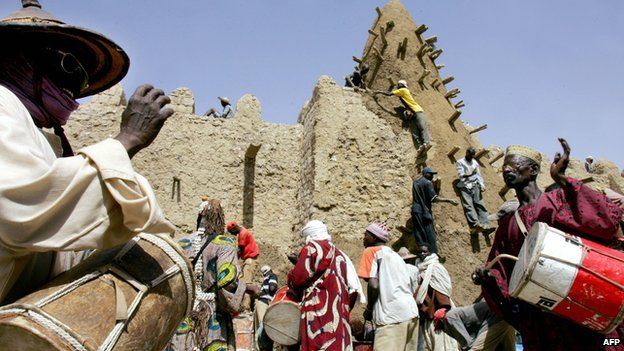Mali crisis: 'Timbuktu joy after life of fear'
- Published

Residents of Timbuktu in northern Mali have been living under Islamist rule for the last nine months.
The historic city is a World Heritage site, renowned for its architecture, manuscript libraries and centuries-old shrines to Islamic saints - revered by Sufi Muslims but which the Salafi militants consider idolatrous.
Following France's intervention in Mali last week, a Timbuktu resident, who asked to remain anonymous, told BBC Africa about reaction in the city to the Islamist fighters' apparent withdrawal.
Timbuktu resident:
We are happy, we want to thank France because they did well [although there are no French troops in Timbuktu at present].
Now, we feel free.
[From the time the French intervention began], the Islamists began to panic.
Some left town, they went about 60km (40 miles) outside Timbuktu, and other headed towards Douentza.
The city is quiet.
They left by car [the same cars they used to get into Timbuktu].
There were many of them, but now only a few are left, and they are not strong. They are trying to hide in town.
We are now beginning to be free.
[All types of Islamists] were here, they brought chaos to Timbuktu.
We couldn't just go out if we wanted to.
They beat men, women, children. They cut people's hands. They killed people.
We were afraid.
We didn't have a choice.
They destroyed mausoleums, we were not happy about that.
But people are now able to go out.
People have freedom. People are happy. They can move about freely.
They are not under pressure.
People are smoking, people can do anything they want.
So it is important. So we want France to carry on [with the intervention].
There is no city administration.
There has not been one for the past nine months [since the Islamists took power].
'No work'
Today everyone can do as they please. We would like the French to come to Timbuktu. I would like to see their faces.
Ever since the Islamists arrived, we have not been able to work.
I have not been able to do any work for nine months. There is no work, nothing is going on.
There was no-one to work with, no clients. They fled.
I lost a lot - all my savings. I needed to eat.
I hope to resume normal activities in a month or two.
When peace returns, we will be able to talk [more openly about what happened under the Islamists]."